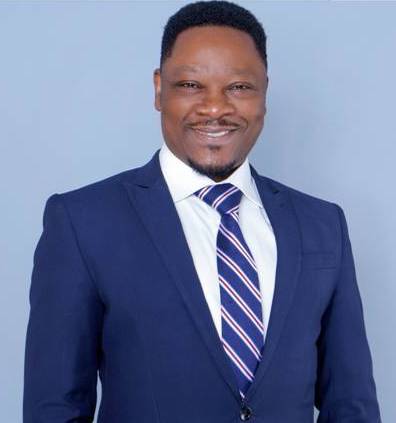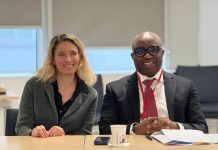In no particular order, I acknowledge the presence of highly distinguished individuals who have been penciled down to participate in this session of this great event. I will stand on existing protocol but taking a cue from the personalities listed for participation in this session, permit me to specially recognize the presence of the following:
Protocols, Distinguished:
- His Excellency, President Muhammadu Buhari, GCFR, President Federal Republic of Nigeria
- Alhaji Mohammed Musa Bello, Honourable Minister, Ministry of Federal Capital Territory
- Major General Baba Gana Monguno (Rtd), National Security Adviser
- His Excellency Ogbeni Rauf Aregbesola, Honourable Minister of Interior
- Rt. Hon. Femi Gbajabiamila, Hon, Speaker, House of Representatives
- Abubakar Malami SAN, Attorney General of the Federation and Honourable Minister of Justice
- His Excellency Senator Bala Mohammed, Executive Governor of Bauchi State
- Her Excellency Ms Catriona Laing, British High Commissioner to Nigeria
- Mele Mele Kyari, Group Managing Director, NNPC
- Engr. Simbi Kesiye Waribote, Executive Secretary, Nigerian Content Development and Monitoring Board
- Prof Umar Garba Danbatta, Executive Vice Chairman, Nigerian Communications Commission
- Engr. Sanusi Garba, Chairman, National Electricity Regulatory Commission
- Prof. Mahmood Yakubu, Chairman, Independent National Electoral Commission
- Mr. Rick Kennedy, Chairman, Oil Producers Trade Section and Managing Director/CEO Chevron Nigeria Limited
- Dr. Hamid Boboyi, Executive Secretary, Universal Basic Education Commission
- His Majesty King Dr Edmund M Daukoru FIC, CON, Mingi XII, Amanyanabo of Nembe Kingdom and Chairman, South –South Monarchs Forum
- His Excellency (Dr) Senator George Akume CON – Hon Minister of Special Duties and Intergovernmental Affairs
- Captains and Key Stakeholders in the Private and Public sectors of the Nigerian economy
- Distinguished speakers
- Members of the Press
- Ladies and Gentlemen
ATCON is the premier telecommunications and ICT association in Nigeria. ATCON members cuts across 9 business segments of the telecom and ICT sector in Nigeria namely Telephone Operators (PNL/Fixed Line Operators, MNOs/IDAs Operators), Infrastructure Providers (Interconnect, Data Centre Operators, Towers/Base Stations Providers); Internet Services Providers (ISP) (Wholesale Segment, Retail Segment), Value Added Services Providers (VAS), Over The Top (OTT) Players, FINTECH/e-Commerce Operators, Telecom/ICT Equipment Manufacturers, Telecom/ICT Consulting firms, and Telecom/ICT Equipment Dealers. The services offered by ATCON members are critical to the running of the economy and have significantly contributed to the growth of the GDP of Nigeria as well as enhancement of the quality of lives of Nigerians. The subject matter of this keynote address is therefore one that ATCON is very familiar with as it represents the core of our daily activities.
To fully appreciate the importance of the subject matter it will be good to establish the components of the Nigerian state that comprises Nigeria’s Critical Infrastructure, Monuments, and Business Assets and the role they play in the daily lives of Nigerians.
Critical National Assets and Infrastructure (CNAI)
Critical National Assets and Infrastructure (CNAI) has been defined as assets, services and systems that support the economic, political and social life of a nation. They cut across every sector necessary to maintain normalcy in daily life. The sectors include: ICT, Energy, Financial, Commercial Facilities, Critical Manufacturing, Dams, Emergency Services, Food and Agriculture, Chemicals Supply, Government Facilities, Healthcare, Transportation, Water Supply, Waste Management, and Education Facilities, amongst others.
These assets are both physical and intangible but the efficient running of these infrastructure ensure that the citizens continue to maintain a good quality of life
National Monuments and Cultural Heritage
A National monument is a historic site or geographical area, owned and maintained in the public interest by the federal government. To appreciate the concept of national monuments preservation in Nigeria, we must expand our discussion beyond the physical monuments to also include the cultural heritage of Nigeria.
According to UNESCO the term cultural heritage encompasses several main categories of heritage including cultural and natural heritages. Cultural heritage are cherished characteristic features consisting of physical artefacts and intangible attributes of such societies that are inherited from past generations, maintained in the present and bestowed for the benefit of future generations. They evolve from the ingenious activities of humans, preserved and transmitted through oral traditions or in written concrete forms across generations of human societies.
Tangible cultural heritages include products that can be touched and seen (e.g., architecture/buildings, defensive walls and tools, cowries, paintings, textiles, pestles, mortars, religious temples, dresses, pottery & potsherd pavements, monuments, books, works of art). Intangible cultural heritages on the other hand include invisible aspects of a peoples’ ways of life such as folklore, kinship, norms, values, worldviews, philosophies of life, religious beliefs and practices, music, dance, festivals, traditions, language, and knowledge among others.
Across Nigeria, the National Commission for Museums and Monuments (NCMM) manages over 51 museums and 65 national monuments and sites. Over 100 proposed sites and monuments are waiting for designation.
Business Assets:
Business assets are items of value that your business owns, creates or benefits from. Assets can range from cash, raw materials and stock, to office equipment, buildings and intellectual property. Although these may be seen as private assets, the crucial role they play in the sustenance of the Nigerian economy and way of life of the citizens makes it important that they are adequately identified and protected. Under the context of the subject matter, protecting business assets will be seen not from a financial and legal maneuver traditionally employed to protect assets from potential financial loss, but rather from the tangible assets perspectives where the physical structures are at risk of vandalism and destruction. Just a few days ago we read of the unfortunate situation where armed robbers attacked several banks in a state in Nigeria and not only destroyed assets of the bank but also made away with money and there was also loss of human life.
State of Nigeria’s Critical Infrastructure, Monuments, and Business Assets
The state of the Nigerian Critical Infrastructure, Monuments, and Business Assets unfortunately is not the ideal situation that will result in the maximum benefits to the citizens. Despite the key benefits that accrue to the Nigerian state from these objects, a lot still needs to be done to ensure maximum benefits to the country. In this Address I will examine the current state of affairs and suggest ways to remedy any challenges observed.
The key challenges being faced in the area of Nigeria’s Critical Infrastructure includes:
- Uneven spread of critical infrastructure across the country
- Vandalism and theft
- Lack of cooperation by many states and local governments with private sector to enable implementation of much needed infrastructure
- Destruction of infrastructure as a result of security unrest in parts of the country
- Lack of human capital
- Lack of adequate funding
The key challenges being faced in the area of Monuments and Artifacts
- Lack of maintenance culture
- Lack of proper inventory and identification
- Theft and vandalism
- Need for creations of new monuments and artifacts
Challenges with Business Assets
- Lack of timely protection from security organs during crises
- Lack of public utility and infrastructure leading to high cost of business
- Lack of ideal long-term financing options
Positive Outlook and Current Steps
Despite the challenges highlighted above, I am gladdened by the efforts being made to address these issues. The conveyance of this Summit is a testament that these challenges have been identified and the will exists to address them.
The efforts by the office of the National Security Adviser (NSA) in developing policies and guidelines to protect the critical infrastructure is very commendable. The latest edition of Nigeria’s National Security Strategy (NNSS) 2019, captured and emphasised the urgent need for safeguarding these assets. Key components of the strategy document include the objectives of identifying, classifying and prioritizing Critical National Assets and Infrastructure (CNAI) and to determine appropriate levels of protection required for each CNAI or groups of CNAI; enhance the resilience of CNAI to hazards; and minimize the effect of attacks or disasters on CNAI.”
Additionally, the NNSS captured the propensity of the government for the development of a geographical information system (GIS)-based decision support tool which the networks of all stakeholders with contingencies and emergency responses to CNAI protection can contact.
It will also involve the development and activation of response protocols at the National Crisis Management Centre (NCMC) for national security breaches that imperil CNAI. It will conduct periodic inspections and certification of the security preparedness of CNAI.
Furthermore, the document categorically stated that institutional arrangements shall be put in place to coordinate the activities of the federal government with those of states and local governments. The NCMC, established in ONSA, will coordinate CNAI protection, policy development and ensure implementation and liaison across all levels of government and industry. State and local governments are to set up corresponding structures to liaise with the NCMC at the national level to coordinate activities and request assistance where necessary.
Also worthy of note is the digitization of economy being lead by the Honorable Minister of Communication and Digital Economy through the agencies within the Ministry – Nigerian Communications Commission (NCC), National Information Technology Development Agency (NITDA), etc which has put the country in the right path towards ensuring these Critical National Infrastructure is not only developed but also well protected.
The activities of The National Commission for Museums and Monuments (NCMM) in not only identifying the national monuments and artifacts but also carrying out activities that will ensure that factors mitigating the protection of these crucial cultural assets is addressed in due course is well noted and commended.
The efforts of all arms of the security agencies not limited to the military and police force but also the Nigeria Security and Civil Defence Corps which has continued to make tremendous efforts to fulfill its obligation as the lead agency in the protection of critical national assets and Infrastructure through effective synergy with sister agencies and other critical stakeholders within available resources at its disposal is well commended.
Recommended Steps to ensure the protection of Critical National Infrastructure, Monuments, and Business Assets in Nigeria
Nigeria has to take full advantage of modern technology in addressing the challenges confronting its Critical Infrastructure, Monuments and Business Assets. Technology exists today to fully monitor the entire critical infrastructure in the country. Internet of Things presents a great opportunity to have real-time visibility on the critical assets and also provides opportunity to predict when a national asset is about to be vandalized and appropriate steps taken to address the source before it is too late. For instance, a technology exists today to identify when a road construction work is getting close to fiber optics installation and efforts can be made to address the threat before it is too late.
Blockchain technology offers a great opportunity to digitally tag all monuments and artifacts and give them a universal identity against future theft. This is currently be used in protecting endangered species and track assets such as diamonds and precious metals.
However, technology alone cannot solve the problem. Technology without the human will and capital resources will only result in suboptimal progress. The interoperability between the various entities that ensures smooth running of the economy must be appreciated and addressed. Federal, State, and Local Governments must see the critical role that the infrastructure providers play in governance and see the providers of these critical services not only from the prism of revenue generation but as partners in progress whose activities if fully developed will led to better governance and quality of life of the citizens. Eventually more revenue will accrue to the Federal, State, and Local Governments when these infrastructures are fully deployed and operate optimally.
There cannot be adequate security when youths are not gainfully employed. ICT provides a great avenue to train the youths and enable the exports of technology to other countries of the world. Nigeria is blessed with a great youth population that is extremely intelligent and hard working. What is needed is an enabling environment for ICT training with application in various industries and the youths in Nigeria will be gainfully employed and crime will reduce.
As Nigeria’s economy goes full digital and more critical services are managed online, cyber security becomes a major challenge to be tackled from entities both within and outside the country. A strong cyber security workforce must be developed to protect the critical assets of the country.
As the saying goes, the bad actors need to be lucky only once to cause maximum damage. It is also unreasonable to expect systems and processes to work perfectly well 100% of the time. It is therefore imperative that adequate plans are put in place to not only address challenges to critical infrastructure when they occur but also to bring the culprits to book post event.
Redundant systems must be implemented so that when a critical infrastructure fails in operations, the backup system is able to sustain operations unnoticed or if there is a downtime the restoration process is such that there is minimal downtime.
The security agencies must be adequately funded and trained to confront national security challenges. The judicial system must be strengthened so that those found culpable in damaging critical national infrastructure will be adequately punished as a deterrent to others.
Two events in recent times has pointed out that Nigeria cannot afford to not improve our internal processes to ensure protection of our critical infrastructure and monuments. The Covid-19 Pandemic and the current crisis involving Russia and Ukraine has pointed out that fact that no matter the goodwill and sympathy expressed by foreign nations in the moment of crises, the citizens of each country must address their own challenges using internal resources. Nigerians must be educated and enlightened to see all national assets as not belong to the Government but actually belonging to the citizens and all assets must be protected by all.
Conclusion
Nigerian cannot therefore afford not to put in place all the building blocks to address the current challenges facing the country in the area of critical national infrastructure, monuments, and business assets. The time has come to sign and give effects to all pending bills and policies necessary to secure the assets of Nigeria.
Conclusion








